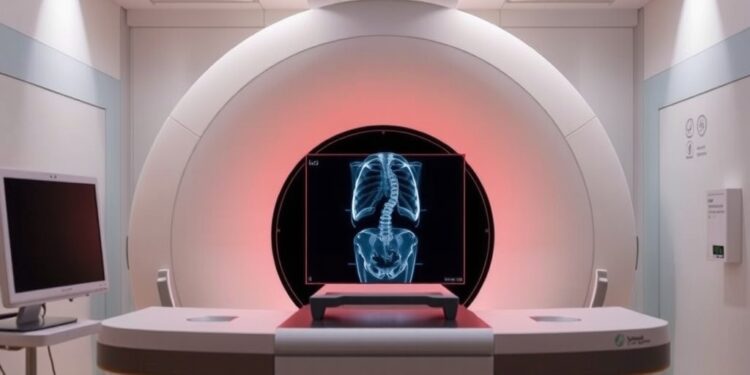
A recent seminal study conducted by UCLA Health Jonsson Comprehensive Cancer Center researchers has illuminated a significant breakthrough in the treatment of prostate cancer. This investigation offers compelling evidence supporting the use of a condensed radiation therapy protocol, which could revolutionize patient care in oncology. Specifically, the research highlights the efficacy and safety of isodose moderately hypofractionated radiotherapy (MHFRT), a treatment that facilitates faster recovery while maintaining treatment effectiveness comparable to traditional methods.
In conventional radiotherapy, prostate cancer patients typically undergo lengthy treatment sessions extending over seven to eight weeks. What sets isodose MHFRT apart is its strategic approach of delivering higher doses of radiation in each session, thereby shortening the overall treatment duration to four to five weeks. This not only aligns better with patient convenience but posits a profound shift in how radiation therapy can be administered effectively.
The analysis of more than 5,800 patients from seven rigorous randomized clinical trials provided valuable insights. Patients receiving MHFRT demonstrated comparable cancer control rates to those undergoing standard radiation therapy, underscoring its viability as a treatment option. The study revealed that the five-year progression-free survival rates were nearly identical, with MHFRT achieving 77.0% compared to 75.6% for conventional treatment. This extraordinary outcome invites a re-examination of existing protocols, potentially ushering in a new era of prostate cancer management.
Safety concerns surrounding potential adverse side effects are paramount in any cancer treatment protocol, particularly for therapies as invasive as radiotherapy. However, the results from this extensive study indicated no significant increase in long-term side effects affecting critical areas such as the bladder and intestines for patients undergoing isodose MHFRT. This discovery reinforces the notion that expedited treatment does not have to compromise patient safety or quality of life.
As Dr. Amar Kishan, the study’s co-first author and executive vice chair of radiation oncology at UCLA, articulated, the evidence robustly supports the argument for isodose MHFRT as the preferred treatment regimen for patients diagnosed with prostate cancer. This perspective challenges the habitual reliance on conventional radiotherapy, which may no longer be the benchmark in treatment efficacy for the demographic examined in these trials.
Questions persist regarding the risks associated with heightened daily radiation doses delivered in MHFRT protocols. Concern about side effects such as urinary incontinence and gastrointestinal issues remain prevalent among medical professionals and patients alike. The study meticulously analyzed these potential risks, contrasting the effects of isodose MHFRT with an alternative regimen known as dose-escalated MHFRT, which aims for a higher total dose in hopes of improving control over tumor progression.
The data accumulated revealed a stark conclusion: while dose-escalated MHFRT was presumed to enhance cancer control, the results indicated otherwise. Both treatment approaches yielded similar five-year progression-free survival rates, at 82.7% for patients on dose-escalated MHFRT and an identical figure for those managed with conventional methods. Compounding this finding, patient-reported outcomes demonstrated a conspicuous uptick in gastrointestinal complications amongst patients receiving the escalated dose—7.2% compared to just 4.9% for those undergoing standard therapy.
These findings from the UCLA study significantly underscore the benefits of isodose MHFRT. The ability to offer equivalent cancer control without the heightened risk of more severe side effects presents a compelling argument for healthcare practitioners to pivot towards this advanced standard of care. It allows patients to not only opt for a shortened treatment regimen but also do so with confidence that they will not be sacrificing treatment efficacy or safety.
The implications of this research extend beyond mere statistics; they resonate in the real-life experiences of patients striving for optimal outcomes in their cancer journey. Less frequent hospital visits and a shorter overall therapy timeline can substantially alleviate the physical and mental burden on patients grappling with prostate cancer. Optimizing their treatment without compromising safety presents a paradigm shift in patient-centered cancer care.
Moreover, as isodose MHFRT continues to gain momentum as a leading modality for prostate cancer treatment, ongoing clinical trials and studies will undoubtedly enrich our understanding of patient responses and outcomes. This validated approach assures stakeholders within the medical community of the protocol’s safety and effectiveness, fostering a collaborative push towards wider acceptance and implementation.
In conclusion, the findings from this large-scale study are a beacon of hope for prostate cancer patients and their families. The nuanced understanding of radiotherapy options can guide patients towards more informed decisions about their treatment pathways. As the research community continues to innovate and explore various modalities, isodose moderately hypofractionated radiotherapy stands as a testament to the advancements in cancer research today.
This study was co-authored by other notable contributors from the UCLA team and was supported by significant grants from both the Department of Defense and the National Institutes of Health. With rapid advancements in radiation oncology and emerging evidence favoring isodose MHFRT, the future of prostate cancer treatment appears increasingly promising.
Subject of Research: Prostate Cancer Treatment
Article Title: Shortened Radiation Therapy Effective for Prostate Cancer Survival
News Publication Date: October 2023
Web References: UCLA Health
References: The Lancet Oncology
Image Credits: N/A
Keywords: Radiation therapy, Prostate cancer, Cancer treatments, Side effects, Clinical trials, Toxicity, Clinical research.
Tags: cancer control ratesclinical trial analysisearly-stage prostate cancerhypofractionated radiotherapyincreased radiation dosesMHFRT effectivenesspatient care in oncologyprogression-free survival ratesprostate cancer treatmentradiation therapy advancementstreatment duration reductionUCLA Health research





